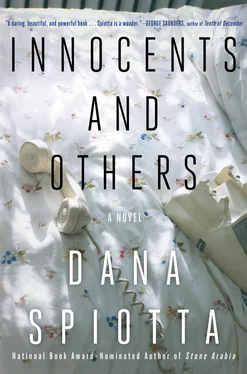Dana Spiotta - Innocents and Others
Здесь есть возможность читать онлайн «Dana Spiotta - Innocents and Others» весь текст электронной книги совершенно бесплатно (целиком полную версию без сокращений). В некоторых случаях можно слушать аудио, скачать через торрент в формате fb2 и присутствует краткое содержание. Год выпуска: 2016, Издательство: Scribner, Жанр: Современная проза, на английском языке. Описание произведения, (предисловие) а так же отзывы посетителей доступны на портале библиотеки ЛибКат.
- Название:Innocents and Others
- Автор:
- Издательство:Scribner
- Жанр:
- Год:2016
- ISBN:нет данных
- Рейтинг книги:5 / 5. Голосов: 1
-
Избранное:Добавить в избранное
- Отзывы:
-
Ваша оценка:
- 100
- 1
- 2
- 3
- 4
- 5
Innocents and Others: краткое содержание, описание и аннотация
Предлагаем к чтению аннотацию, описание, краткое содержание или предисловие (зависит от того, что написал сам автор книги «Innocents and Others»). Если вы не нашли необходимую информацию о книге — напишите в комментариях, мы постараемся отыскать её.
Innocents and Others — читать онлайн бесплатно полную книгу (весь текст) целиком
Ниже представлен текст книги, разбитый по страницам. Система сохранения места последней прочитанной страницы, позволяет с удобством читать онлайн бесплатно книгу «Innocents and Others», без необходимости каждый раз заново искать на чём Вы остановились. Поставьте закладку, и сможете в любой момент перейти на страницу, на которой закончили чтение.
Интервал:
Закладка:
But here is what is also true:
Meadow feels momentarily good despite the shame. It feels good to lose her indifference, to move outside her own experience for an instant, however complicated it is. At least there is a glimmer of truth in admitting that she has had great good luck in this life. Admitting that, confronting that.
And:
As problematic as the giving could be, she cannot abide the alternative. Ignoring the person. Looking away and hurrying by. Saying no (in a barely audible voice as if the conversation hasn’t actually happened or shaking a head slightly, also not wanting to give it full engagement or open up any avenue of discussion). So awful does it make her feel that on the occasions she has ignored someone (because the light was changing, because her hands were full, because — oh god — she was in a rush, perhaps a bit late), she has ruminated and felt the sting of her own selfishness so acutely that she has even circled back to find the person (driven around the block, walked back to the corner, put her bags down and located her wallet), apologized as if they have even noticed her passing them (what do they want with her apology, she is forever making it more awkward, more undignified, her apology only to repair her vanity about her own generosity, her own porousness), given them five dollars or ten dollars and hurried away before the thank-yous, which are too much, much more than she deserves. (Sometimes she feels that it is entirely transactional: she pays them so they will thank her. She is buying a feeling of gratitude from them.)
But of course there is also this:
They want the money and need the money. About the want and need there cannot be any doubt. They have asked for it because they desperately need it. They want the help, even if futile. It serves them as well. She knew they would buy food or drugs or drink or all of those things. Maybe some cigarettes or a thick sweet cup of coffee somewhere indoors. Maybe some Handi Wipes, toothpaste, a room with a shower. Whatever can be bought that is needed to endure the day. And so it cannot be refused. All of that came to her if she thought about it, which she did. Yet she also, like most people, soon moved on to whatever else occupied her. But then came this particular incident, with this particular woman, and Meadow saw that she was changing in ways she was still discovering.
* * *
Meadow had pulled into the post office parking lot. The line would be long. The lot was nearly full. She reached over to the passenger side and grabbed the package off the seat. Why would 10 a.m. be a crowded time at the post office? She felt her coat pockets as she locked the car: phone, wallet, cigarettes.
A tall woman with stiff dark brown curls reached the glass door just as Meadow did. The woman stopped as Meadow rushed forward (always in a rush!), and then there was a slight hesitation between them before the woman stopped and held the door open for her. Meadow said, “Thank you.” The woman looked at her, large brown eyes, wide gleaming smile, and then looked at the ground. She looked very something. She looked young. Meadow passed her and then worried about being ahead of the woman in line. The woman — a girl, really — had almost deferred to her. Apologetic or something. Did she have a mental disability? Meadow stopped at the doorway to the main room, held the second door open, and waited for the tall girl to pass her. The girl again hesitated, and Meadow gestured with her hand toward the line. The girl flashed a smile, eyes open and bright. She took her place ahead of Meadow in the long line.
It was a muddy, salty, cold day. The girl undid her scarf and unbuttoned her gray overcoat, and then she took off her coat. She was slim and tall in polyester navy slacks and a sweater. A plastic bag of clothes hung from her wrist. Meadow watched her carefully roll her coat into a bundle and then walk out of the line and place the bundled coat in the corner of the post office’s main room. She neatly tucked it there, placed her stuffed plastic bag on top after removing a small zipper pouch. She then walked back to the spot in front of Meadow. The bottom cuffs of her pants were crusted with mud. Could be homeless. But she looked so clean otherwise. And would a homeless person trustingly put her coat and bag in the corner and leave it? She was young, pretty, clean. Not living on the street. But she walked a long way in the street to get here. With no boots and her stuff in a plastic bag.
The line moved slowly. By the time the tall girl was at the front of the line, Meadow had her wallet out. Meadow looked at the package in her hands and read the name she had written, checked that the package was sealed. Checked in her wallet, checked the time on her phone. She waited. Two service windows opened at the same time. The tall girl with the muddy pant hems went to one, and Meadow went to the one next to it. The postal clerk in front of her was taping her package and then weighing it. The clerk at the next window, helping the tall girl, spoke in a loud, clear voice.
“Hello! Good news. I called the refugee center, and they said you can stay there and receive mail while you sort out your visa issues.”
Meadow stole a side glance at the girl. Of course. She was foreign, not American. She held a green passport in her hand. Meadow handed the clerk her credit card. She did not turn toward the girl, but she could hear the other clerk speak to her.
“What you need to do is send this passport by express mail to the embassy in DC and they will return it overnight. But it costs twenty dollars each way, so forty dollars to send it.” There was a long pause. “Sorry,” the clerk said, “but that is what you need to do to be sure it gets there and back.”
The postal clerk sounded kind. Meadow admired her. She could feel the line restless behind them. Meadow waited for the clerk at her window to give her a receipt.
“Four dollars?” the tall girl said with a British accent. Meadow looked sideways and saw the girl’s zipper wallet open in her hands.
“No, four-tee dollars. Four zero.” The clerk wrote the number on a piece of paper.
The tall girl smiled and shook her head at her wallet.
“I know, I am sorry,” the clerk said. “That is what it costs. There is nothing I can do about that. You can go to the center and see what they say. And then come back here…” The tall girl stood there, saying nothing. Meadow shoved her receipt into her own wallet, and saw two twenties in the cash section. She had exactly forty dollars in cash in her wallet. Exactly. She pulled them out of her wallet, and felt her heart start to pound a little, like she was going onstage.
Meadow walked toward the tall girl at the window and as she passed she looked down and placed the two twenties on the counter next to the girl’s hand.
“Do it. You should send it express,” Meadow said, not looking, not stopping really. But Meadow turned her head and looked back at them for a second as the money registered, as they understood. The tall girl looked up and said, “Thank you,” in a high voice. She smiled, so broadly her mouth opened, and the clerk laughed. “Welcome to Albany, young lady!” the clerk exclaimed. The line was behind Meadow, but she could feel them watching. Meadow walked faster and did not look back again. She was in the parking lot, rushing toward her car.
She got in, flushed, heart pounding in her ears. She sat there. The tall girl looked so surprised and happy. It was no big deal, the money meant nothing to Meadow. Forty dollars was spent without blinking. Hardly an act of generosity or charity. Her heart continued to make its beats felt in her ears. She could hear her own excited breaths. How small and easy a gesture. How satisfying. Meadow sat in the driver’s seat, holding her keys. She put her hand to her forehead, lowered her chin, and let out a soft sob as she began to cry. She felt the tears blur her eyes and slide down her cheeks. She opened her palm across her forehead and let her head rest for a second. It calmed you, a palm, even your own. She let herself keep crying, and the sounds vibrated in her ears. Meadow took her hand off her forehead and sat up. She found a tissue in the glove box and held it to her nose, which had began to run. It felt, she thought as she inhaled and sniffed, so calming. She pressed the tissue to her nose. The crying, the gesture, the action, the moment, the smile. It was stunning how good it felt.
Читать дальшеИнтервал:
Закладка:
Похожие книги на «Innocents and Others»
Представляем Вашему вниманию похожие книги на «Innocents and Others» списком для выбора. Мы отобрали схожую по названию и смыслу литературу в надежде предоставить читателям больше вариантов отыскать новые, интересные, ещё непрочитанные произведения.
Обсуждение, отзывы о книге «Innocents and Others» и просто собственные мнения читателей. Оставьте ваши комментарии, напишите, что Вы думаете о произведении, его смысле или главных героях. Укажите что конкретно понравилось, а что нет, и почему Вы так считаете.












